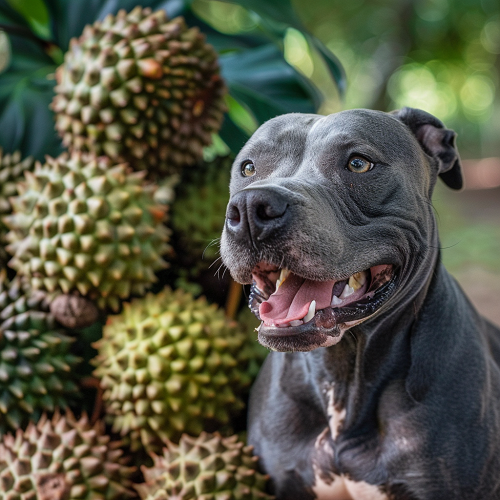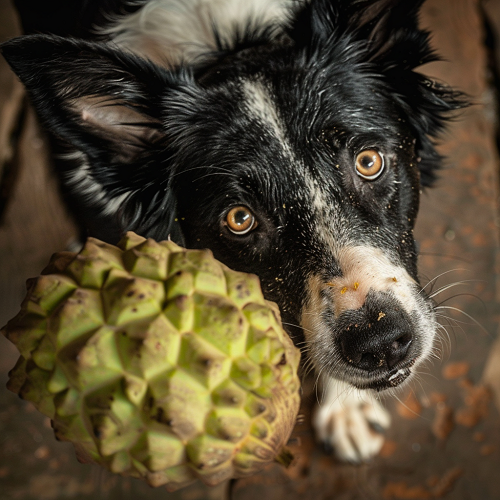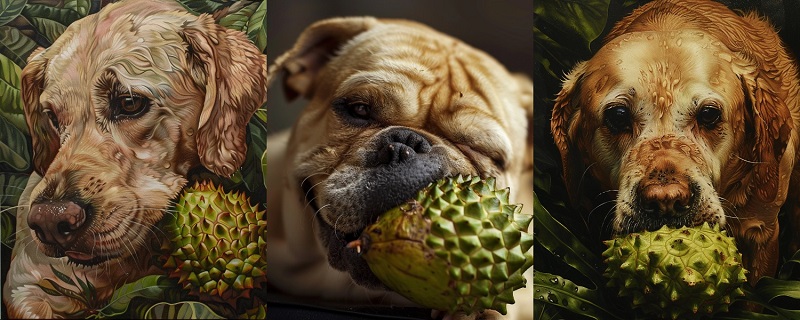Soursop, also known as graviola or guanabana, is a tropical fruit cherished for its sweet and tangy flavor and its numerous health benefits. As pet owners, it’s crucial to know which foods are safe for our furry friends and which ones might pose risks. This article explores whether dogs can safely eat soursop and provides a thorough analysis to help you make informed decisions about your dog’s diet.
Understanding Soursop
Soursop is a green, spiky fruit with a creamy, white interior. Its flavor is often described as a combination of strawberry and pineapple. Rich in fiber, vitamins (especially vitamin C), and minerals, soursop is praised for its potential health benefits, including anti-inflammatory and antioxidant properties. It is commonly used in juices, smoothies, desserts, and traditional medicines. However, is this fruit so beneficial for dogs?
Nutritional Needs of Dogs
Dogs require a balanced diet to maintain their health and vitality. Essential nutrients for dogs include proteins, fats, carbohydrates, vitamins, and minerals. Their diet typically consists of high-quality commercial dog food, which is formulated to meet their nutritional needs. Some foods, like certain fruits and vegetables, can be safely included in their diet, while others should be avoided.
Safety of Soursop for Dogs
When considering soursop for dogs, it’s important to examine its components and potential effects:
Nutritional Benefits. Soursop contains fiber, vitamins, and minerals that could theoretically benefit dogs, such as supporting digestion and providing antioxidants.
Risks and Concerns:
-
Seeds: Soursop seeds contain toxins that can be harmful to dogs if ingested.
-
Sugar Content: The high sugar content in soursop can lead to weight gain and dental issues in dogs.
-
Toxic Substances: There are concerns about certain alkaloids present in soursop, which might be harmful in large quantities.

Expert Opinions and Veterinary Advice
Veterinarians and pet nutrition experts generally advise against feeding soursop to dogs. While the fruit’s flesh might not be directly toxic, the risks associated with seeds and high sugar content outweigh potential benefits. Cases where dogs have consumed soursop without immediate adverse effects often involve small quantities, but it’s best to err on the side of caution.
Alternatives to Soursop
Instead of soursop, consider these dog-friendly fruits:
-
Blueberries: Packed with antioxidants and fiber.
-
Apples: Provide vitamins A and C, but avoid the seeds.
-
Bananas: High in potassium and easy to digest.
Introduce new fruits gradually and in small amounts to monitor your dog’s reaction.
What to Do If Your Dog Eats Soursop
If your dog accidentally eats soursop:
- Monitor Symptoms: Watch for signs of toxicity, such as vomiting, diarrhea, lethargy, or seizures.
- Immediate Steps: Remove any remaining soursop to prevent further consumption.
- Contact a Veterinarian: Seek professional advice, especially if symptoms occur or if a large amount was consumed.
- Preventative Measures: Keep soursop and other potentially harmful foods out of your dog’s reach.
While soursop offers numerous benefits for humans, it is not a recommended food for dogs due to the potential risks associated with its seeds, high sugar content, and possible toxic substances. Always consult with a veterinarian before introducing new foods into your dog’s diet to ensure their safety and well-being.

Frequently Asked Questions + Answers
-
Can small amounts of soursop be safe for dogs?
-
Are there any parts of the soursop that are safe for dogs to eat?
-
How can I tell if my dog has eaten something toxic?
It’s best to avoid soursop altogether due to the potential risks.
The flesh might be less harmful than the seeds, but it’s still not recommended.
Watch for symptoms like vomiting, diarrhea, lethargy, and contact your veterinarian immediately if you suspect toxicity.
Additional Resources
PetMD: Human Foods Dogs Can and Can’t Eat
ASPCA Animal Poison Control
American Kennel Club: Fruits and Vegetables Dogs Can and Can’t Eat
By providing a comprehensive overview and detailed information, this article aims to help pet owners make safe and informed choices regarding their dogs’ diets. This article is for informational purposes only. If you see that your pet feels bad, seek professional medical advice immediately.


